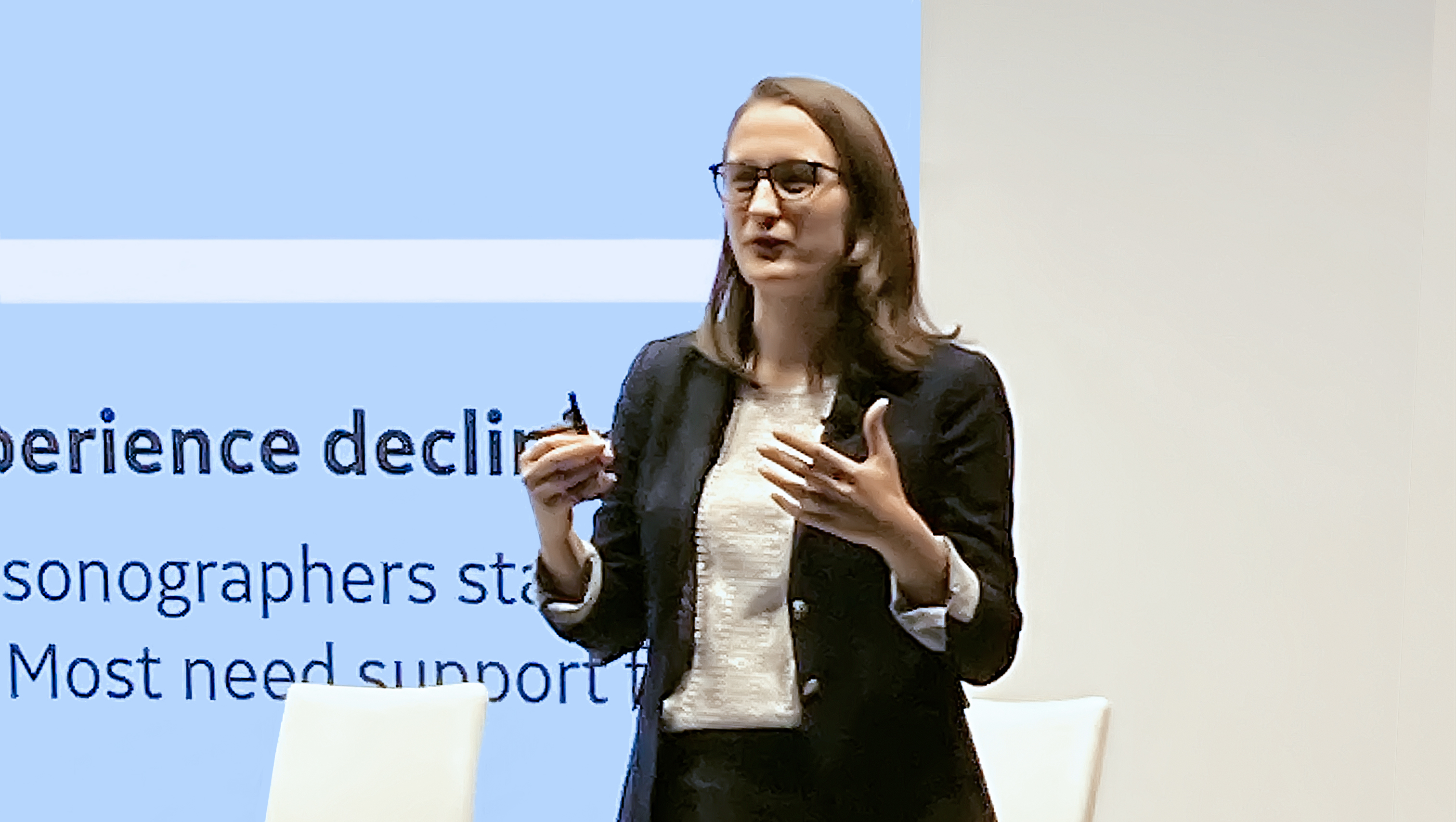Karley Yoder is GM and Chief Digital Officer, Ultrasound at GE HealthCare, a company that enables clinicians to make faster, more informed decisions through intelligent devices.
Karley leads the GE HealthCare’s engineering, data science, and product teams as they create innovative ways to apply AI and ML to devices and boost efficiency. She works within a startup ecosystem, helping to build tools that allow global healthcare professionals to provide the best outcomes for patients.
Karley recently joined a panel discussion on artificial intelligence (AI) and machine learning (ML), moderated by Shaown Nandi, Solutions Architects and Customer Solutions Leader at Amazon Web Services (AWS).
Putting the Patient Back Into Healthcare
The pandemic put a spotlight on healthcare organizations, revealing the good and bad. Even before Covid, global healthcare systems felt cost pressures due to razor-thin margins. But the pandemic showed there were more patients than caregivers could handle — and burnout was rampant.
A recent study shows healthcare professionals spend only 27% of their time with patients.1 That means 73% of that time is spent doing administrative tasks and paperwork. Most medical professionals didn’t go into healthcare to spend almost three-quarters of their time doing paperwork.
Enter AI and ML. Karley’s focus on healthcare innovation and product development that integrates data science ultimately puts the patient back at the center of the healthcare industry.
And what does that mean for clinicians?
Time savings. AI and ML-led systems can use deep learning to perform mundane, repetitive tasks that providers do today. These devices can either complete repetitive tasks faster and autonomously or help medical professionals do them more efficiently.
Karley’s team focuses on creating AI solutions that address high-power pattern recognition tasks efficiently and quickly, then deliver the results to providers. And they make it as seamless as possible.
The Problem-Solving Journey
AI and ML are finding their way into countless industries — from HR and sales to finance — and enterprise AI dominates news headlines. While AI is evolving rapidly, we’ve also been surrounded by this technology for years. Just think about typing a search into Google. When the results populate seconds later, it’s not search engine magic. It’s AI technology.
And today we can increasingly harness AI and ML to solve a myriad of problems. For example, Karley and the team at GE HealthCare start by defining and isolating issues in industry workflows by putting themselves in clinicians’ shoes. They pinpoint processes that take significant time, energy, and money to complete. They then explore using AI or ML to create a tool to automate and solve those problems.
Data Preparation
GE HealthCare’s mission is to build precision medical imaging and devices that perform flawlessly for every patient on a global scale. To drive healthcare innovation, Karley and her team keep platforms and ecosystems at the heart of their work.
Karley also estimates that a significant amount of work also focuses on data preparation, the process of preparing raw data for additional analysis. This is critical because it becomes the backbone of the AI and ML systems.
In fact, Karley and her team have created a tool within their Edison platform to easily prep healthcare data before it is handed off to the data scientists. This means data scientists can focus their time on building the best AI systems for specific tasks — for example, an MRI machine to reduce scanning time. It can also be used to make the patient more comfortable while still getting accurate diagnoses to determine the best treatment options. For example, AI-based algorithms can analyze real-time MRI scanner noise patterns and generate counteractive sounds or adjust the pulse sequences to minimize noise levels. This makes the MRI experience less stressful and more comfortable for patients.
While the world is just scratching the surface of AI in healthcare’s potential, these systems are already changing lives.
Listen to the panel discussion Accelerating Enterprise AI and Machine Learning Innovation to hear more from leaders who have experience in establishing enterprise-wide strategies for accelerating AI/ML innovation and structuring organizations to execute on that strategy.
REFERENCES
- Sinsky, C., Colligan, L., Li, L., Prgomet, M., Reynolds, S., Goeders, L., Westbrook, J., Tutty, M., & Blike, G. (2016). Allocation of Physician Time in Ambulatory Practice: A Time and Motion Study in 4 Specialties. Annals of Internal Medicine, https://www.acpjournals.org/doi/10.7326/M16-0961?articleid=2546704
GE is a trademark of General Electric Company used under trademark license.

